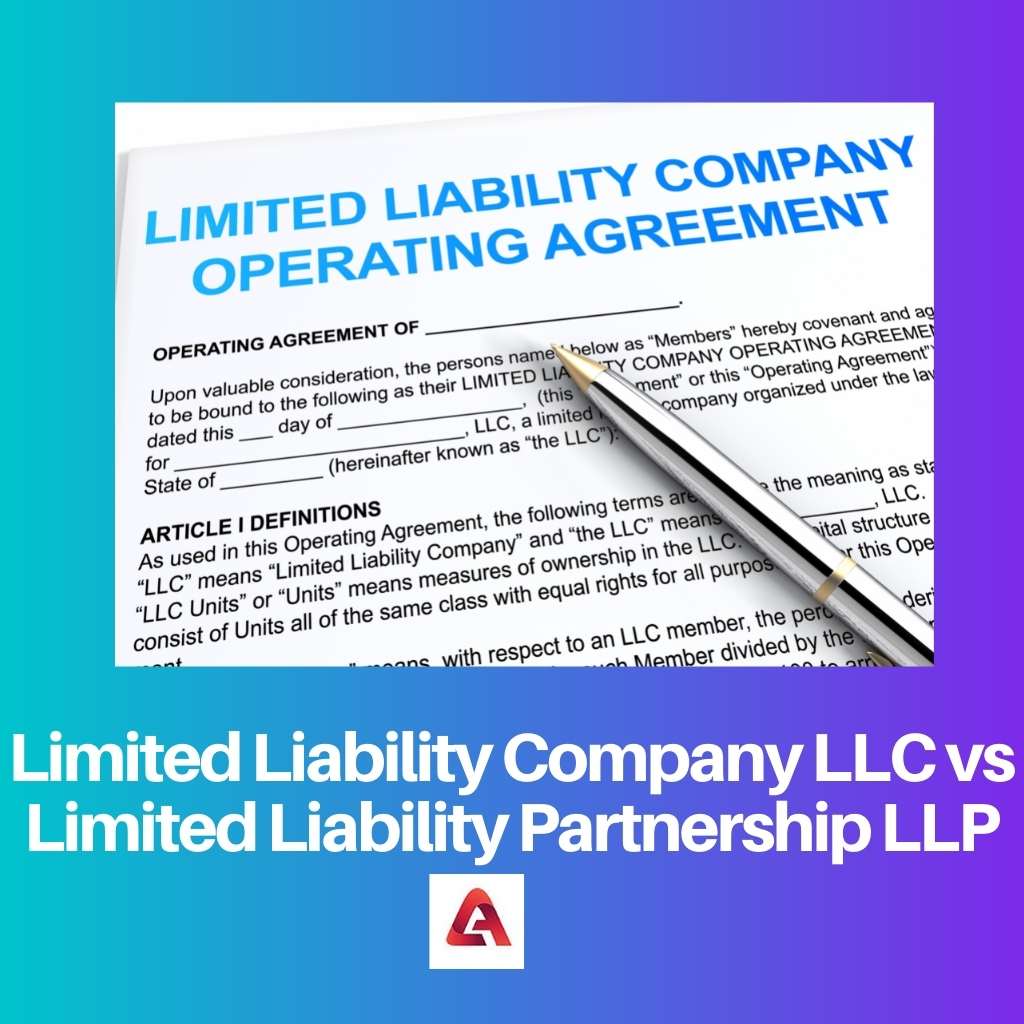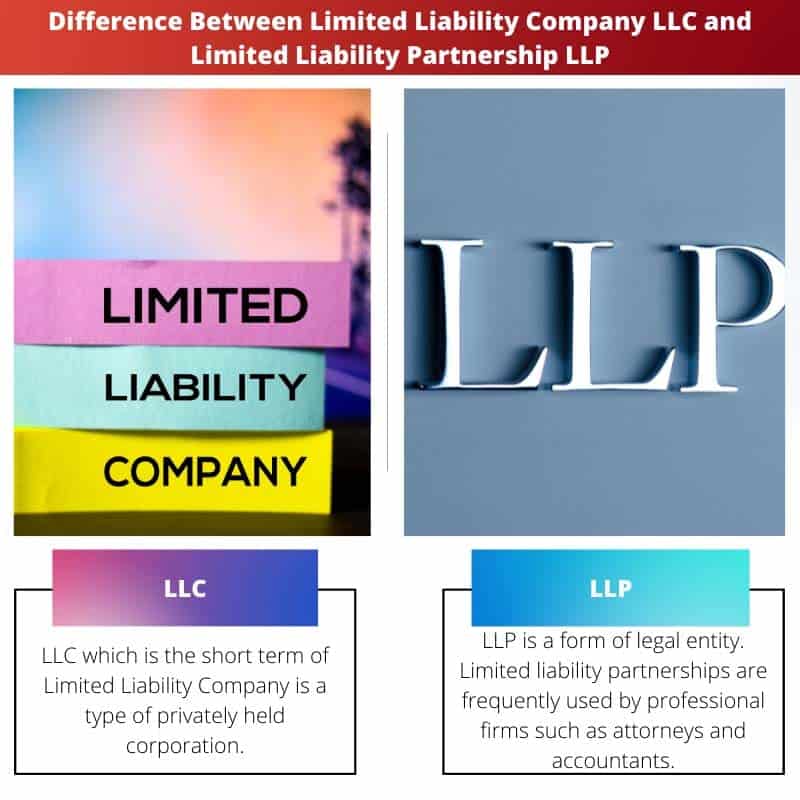LLCs and LLPs are two of the most common legal structures for small businesses. Both types of businesses are pass-through entities, meaning that the owners pay income tax on their portion of the earnings.
The partnership agreement governs the internal system of governance of an LLP, whereas the statute governs the internal system of governance of an LLC.
Key Takeaways
- Limited Liability Companies (LLCs) can have any number of owners, called members, while Limited Liability Partnerships (LLPs) consist of partners with at least one general partner and one limited partner.
- In an LLC, members’ assets are protected from company debts, whereas only limited partners in an LLP enjoy this protection.
- LLCs offer more flexibility regarding management structure, while LLPs must adhere to a partnership agreement.
Limited Liability Company LLC vs Limited Liability Partnership LLP
LLCs provide limited liability protection to members but are not subject to the same formalities as corporations. LLPs are partnerships in which each partner has limited liability for the business and is personally responsible for their actions and professional conduct.

LLC, an acronym for limited liability company, is a type of corporation that shields its owners from personal accountability for the firm’s debts or obligations.
Limited liability companies (LLCs) are hybrid businesses that combine the advantages of a corporation with those of a partnership or a single proprietorship.
Corporations, individuals, foreign organizations, and other LLCs can all be owners of an LLC.
LLPs are a subtype of alternative corporate structure that offers the partners limited liability and minimal compliance expenses.
It also permits the partners to create their internal structure like they would in a regular partnership. It is a legal entity that is responsible for all of its assets.
An LLP is owned by its members, responsible for particular tasks, such as adhering to the partnership agreement.
Comparison Table
| Parameters of Comparison | Limited Liability Company LLC | Limited Liability Partnership LLP |
|---|---|---|
| Type | Includes features of both a corporation and a partnership. | Pay income tax, dividend distribution tax, and minimum alternative tax. |
| Owners | Members. | Partners. |
| System | Immune from personal accountability. | Partners are individually held accountable. |
| Tax | Pay income tax, dividend distribution tax, and alternative minimum tax. | Has to pay taxes and the alternative minimum tax. |
| Books of accounts | Maintained on an accrual basis. | An option between cash or accrual basis is available. |
What is Limited Liability Company LLC?
LLC,, the short term of Limited Liability Company,, is a privately held corporation. It’s a hybrid structure since it combines the characteristics of a general partnership and a corporation.
One of an LLC’s most significant advantages is its legal protection. An LLC offers a financial barrier between the owner and the firm since it is considered a distinct corporate entity.
This implies that creditors of a company can’t go for the owner’s assets. Flow-through taxes eliminates the cascading effect, resulting in earnings being taxed just once and in the hands of the members.
The owners report the company’s profits and losses on their tax returns. All types of small enterprises use the LLC structure.
Because many states mandate that firms with more than one owner organize as an LLC, the structure is excellent for small to mid-size enterprises with several owners.
LLCs have the advantage of separating personal and legal assets and liabilities compared to ordinary partnerships.
LLCs must declare their sales and earnings to the Internal Revenue Service on Form 1065, which the IRS compares to members’ tax returns.
The regulations or statutes that apply to the LLC in that country control its internal organizational and managerial structure. The rules governing an LLC differ from one nation to the next.

What is Limited Liability Partnership LLP?
LLP is a form of legal entity. Professional firms such as attorneys and accountants frequently use limited liability partnerships, but they can also be a good fit for other sorts of businesses.
A limited liability partnership (LLP) is a legal body that differs from its members, who are solely responsible for the amount of capital they contribute and any personal guarantees.
The partnership is registered with Companies House and may only be utilized by profitable enterprises. Forming an LLP requires a minimum of two partners and has no upper limit.
The tasks and obligations of the mentioned partners are defined by law and governed by a contract or agreement.
An individual, company, or another LLP can form and agree to a partnership.
Professionals who employ LLPs place a high value on their reputation. Most LLPs are formed and managed by a group of experts with extensive expertise and clientele.
The partners reduce business expenses while enhancing the LLP’s ability for expansion by pooling resources. They can share office space, personnel, and other resources.
Most importantly, cutting expenses allows the partners to benefit more from their actions collectively than they might individually.

Main Differences Between Limited Liability Company LLC and Limited Liability Partnership LLP
- LLC is a privately held corporation with features of both a corporation and a partnership. In contrast, LLP is a form of partnership in which every partner’s liability is restricted to the amount of money they invest.
- LLC members are the company’s proprietors, whereas the partners own the LLP.
- Individuals in an LLC are immune from personal accountability for any debts or litigation brought against the company. Creditors and persons who have been directly injured by the firm are unable to sue any of the members of the business for debts but on the other hand in an LLP, partners are individually accountable for their carelessness, but only to the extent that it is caused by them. The activities of an individual are not the responsibility of the other. This indicates that each individual is protected from the other’s wrongdoings.
- The income tax, dividend distribution tax, and alternative minimum tax are all taxes an LLC must pay. In contrast, the LLP is only responsible for paying taxes and the alternative minimum tax.
- The books of a limited liability corporation are kept on an accrual basis, whereas LLPs can keep their accounts on a cash or accrual basis.





